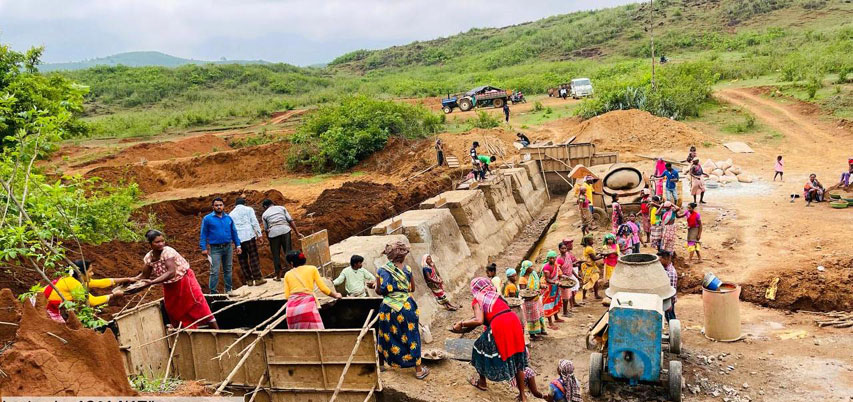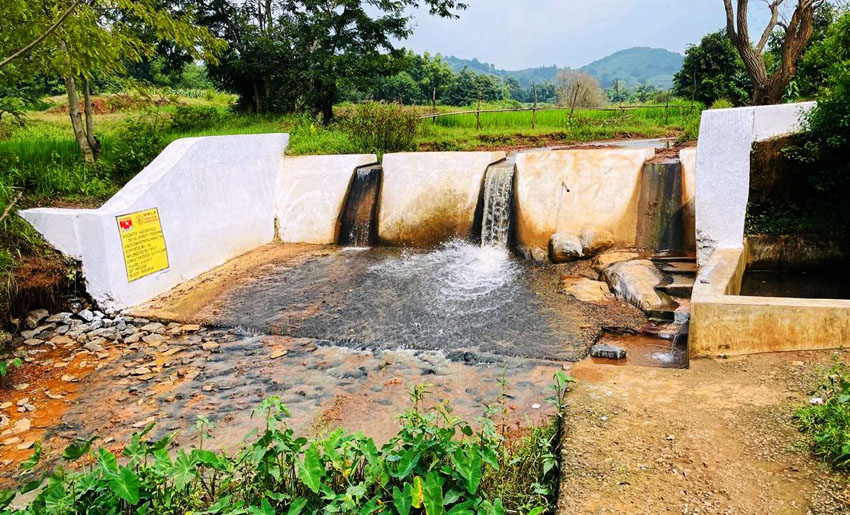THEBUSINESSBYTES BUREAU
BHUBANESWAR, FEBRUARY 12, 2025
Kuguput village, located within Hadiguda Gram Panchayat in Rayagada district, has long faced severe water scarcity, forcing its farmers to rely on rain-fed agriculture that is vulnerable to unpredictable rainfall. In response to this critical challenge, Utkal Alumina International Limited (UAIL), in collaboration with the Bharat Rural Livelihood Foundation (BRLF), has launched Project Neer — a pioneering sustainable water resource management initiative that has not only revitalized the village’s farming ecosystem but also enhanced its economic stability.
Kuguput, home to 127 households comprising Scheduled Tribes, Scheduled Castes, and General Category residents, had long depended on monocropping paddy during the Kharif season. However, erratic rainfall patterns and inadequate irrigation systems resulted in annual crop losses of 15–20 percent. Despite the presence of a perennial stream, the village’s water resources were largely underutilized, and previous efforts to construct a check dam had proven insufficient.
 Recognizing the urgency of these challenges, UAIL and BRLF undertook a thorough survey to identify the root causes of the problem, which included inefficient runoff management, siltation, and poorly designed storage infrastructure. As part of Project Neer, the team proposed a range of innovative solutions, including the construction of Loose Boulder Check Dams, Gabion Structures, and the renovation of existing dams. Central to the project’s design was the adoption of a participatory approach, involving the local community in both planning and implementation through tools like Participatory Rural Appraisal (PRA).
Recognizing the urgency of these challenges, UAIL and BRLF undertook a thorough survey to identify the root causes of the problem, which included inefficient runoff management, siltation, and poorly designed storage infrastructure. As part of Project Neer, the team proposed a range of innovative solutions, including the construction of Loose Boulder Check Dams, Gabion Structures, and the renovation of existing dams. Central to the project’s design was the adoption of a participatory approach, involving the local community in both planning and implementation through tools like Participatory Rural Appraisal (PRA).
At the heart of the initiative was the renovation of the village’s check dam. Under the guidance of the newly formed Kuguput Water Users’ Committee, which included 10 lead farmers, renovation work included platform construction, stone patching, and expansion of catchment areas over 205 acres. These interventions enhanced the dam’s storage capacity, increasing it to approximately 7 lakh litres and enabling irrigation for 50 acres of farmland.
The impact of these changes has been transformative. With improved water availability, farmers have shifted to double cropping, leading to an increase in paddy yields by 5 quintals per acre. Furthermore, 30 households have embraced vegetable cultivation, generating an additional income of Rs 15,000 annually.
Highlighting the success of the project, UAIL Unit Head Rabi Mishra said, “Project Neer exemplifies our commitment to sustainable development and community empowerment. By improving water accessibility and engaging the local villagers in every stage of the process, we have facilitated a shift from vulnerability to self-sufficiency in agriculture. This initiative is a shining example of how community-driven water resource management can foster sustainable agricultural practices.” He further added, “By addressing water scarcity and encouraging crop diversification, Project Neer has significantly enhanced livelihoods and bolstered economic resilience in Kuguput.”
The positive impact of the project was echoed by villagers as well. Alok Majhi, a farmer and direct beneficiary of the project, shared, “Before the project, we struggled to cultivate even one crop due to water shortages. Now, with improved irrigation, my family has started growing vegetables and earning more than ever before. This project has truly transformed our lives.”
positive impact of the project was echoed by villagers as well. Alok Majhi, a farmer and direct beneficiary of the project, shared, “Before the project, we struggled to cultivate even one crop due to water shortages. Now, with improved irrigation, my family has started growing vegetables and earning more than ever before. This project has truly transformed our lives.”
As a responsible corporate entity, Utkal Alumina International Ltd. remains committed to the socio-economic well-being of communities, particularly in the tribal hinterlands. All UAIL initiatives are implemented under the Aditya Birla Centre for Community Initiatives and Rural Development, chaired by Rajashree Birla. UAIL’s engagement extends across 232 villages in 25 Gram Panchayats of Odisha, enriching the lives of over 2,01,000 people through five key intervention areas: education, healthcare, sustainable livelihoods, rural infrastructure, and addressing socio-economic concerns in alignment with the United Nations Sustainable Development Goals (UNSDGs).
 The Business Bytes
The Business Bytes